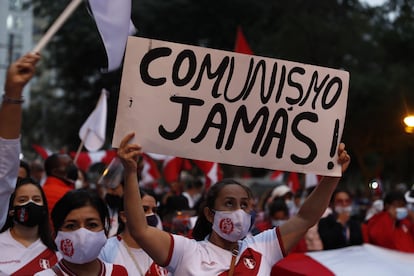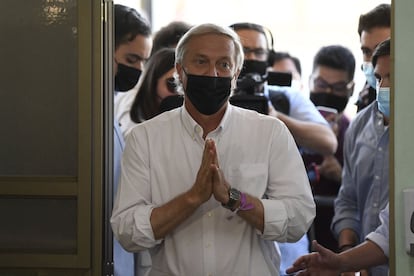With Trump’s populist model a failure in Latin America, where does that leave the right?
The more neoliberal politicians failed due to their disconnect with citizens, while the more reactionary ones conjured up the old ghost of communism yet lost their last three elections. What’s left for conservative parties in the region?

Latin America is turning left. The triumphs of Xiomara Castro in Honduras, Pedro Castillo in Peru and above all the impact of Gabriel Boric’s landslide victory in Chile have been decisive. However, in the spirit of a researcher picking over shipwrecks, I would like to ask: what is happening with the right in Latin America?
Make Latin America great again
The election of Jair Bolsonaro in 2018 was something new in Latin America. After decades during which the right was essentially part of the Washington Consensus, diagnosing free markets and liberal economic policies as cure-alls, the Brazilian president pushed a reactionary social, cultural and political agenda first. Helped by the example of former US president Donald Trump, a new right wing was emerging on the continent.
The momentum of this ideology spread in the region and was dressed up as anti-communism. Bolsonaro in Brazil and José Antonio Kast in Chile expressed admiration for the dictatorships of the 1970s, while in Peru, Keiko Fujimori trumpeted her father’s government – largely a later version of a classical military regime. The Latin American right, in short, unfroze the Cold War arsenal and went out to fight a battle of hearts and minds against communism.
But its last three electoral attempts failed. In Honduras, the cry of “patria sí, comunismo no” [yes to homeland, no to communism] against Xiomara Castro was unsuccessful. In Peru, the entire right wing redefined Keiko Fujimori to personify freedom, and in Chile, Kast and the right wing believed that it would be enough to summon the old demons of communism. They were all roundly defeated.
It is not surprising that these proposals to turn back the clocks fail. Fear is a feeling that can sometimes lead to an electoral triumph, especially in societies with fragmented political systems and where two-thirds of citizens consider all politicians to be corrupt, as outlined in the 2021 survey by the Latin American Public Opinion Project. However, it is a sentiment that does not build a common goal or the possibility of real improvements.
More importantly, many of their invocations are simply outdated. The repeated mantra of the “family” that seeks to keep women at home, or the explicit rejection of LGBTQ+ communities doesn’t play well on a much-changed continent. Xenophobia and racism don’t help either: perhaps no statistic outlines this better than the percentage of women under 30 who voted for Boric: 70%.

It is understandable that in the United States there is a sector of society that longs for the America of years past, when being white provided some kind of social protection for life, and when wages were higher and unions were strong. To go in search of this golden era in Latin America is simply ridiculous, however.
Better managing the status quo
There is another right-wing faction on the continent: the heirs of the neoliberalism of three decades ago. Pedro Pablo Kuczynski in Peru, Sebastián Piñera in Chile, and Guillermo Lasso in Ecuador (and in some ways Mauricio Macri in Argentina), embody a more managerial right wing bent on reviving the reforms of the Washington Consensus. In Peru, Chile and Pedro Duque’s Colombia it appears as a promise to do the same as always, but a little better.
However, success was elusive for the president-managers: Kuczynski was unable to stay in power; Piñera declared war on his people and ended up mired in corruption allegations; Macri, who had said that inflation could be solved, failed to get Argentina’s economy back on track and lost his bid for re-election.
All of these men exhibited a tremendous disconnect with their countries. Their names usually appear in the data leaks that every now and then reveal the intimate dealings of tax havens. This right wing embodies a Latin American minority that, with their luxury schools, gated communities and exclusive clubs, does not learn to become citizens, but rather owners, of their nations.
Challenge
Political scientists have shown that the establishment of conservative parties has been crucial for the institutionalization of democracies in Europe and Latin America. Our democracies need a right wing (and a left, it should be stressed). But we have no use for a right that celebrates military dictatorships or is nostalgic for the time when neoliberalism was a dynamic new concept. The right needs to invent its own future.
This is not only a matter of electoral strategy. Brazil’s significant inflation means the economy is languishing, and after more than 600,000 deaths from the Covid-19 pandemic, Bolsonaro is still not vaccinated and is trying to halt the immunization of children because he does not know that anyone between the ages of five and 11 who has died from the disease. You don’t have to be a Maoist to reject such a failure.

Throughout the region, the right wing explains this drift into irrelevance with an argument more or less along the lines of: “We are doing badly because the left won the battle of ideas and monopolized the narrative.” That’s lazy. Several political scientists in recent years have shown that turns to the left or to the right are political phenomena, but not social: the values of Latin American society have not shifted significantly to the left or to the right.
Besides being wrong, this is also a condescending argument. It disqualifies criticism and the will for change in a continent where 34% of the population did not have enough to eat in 2021. This explanation also ignores that there is also a very strong narrative of capitalism and entrepreneurship in the region. But instead of a critical self-examination, the right is lulled into a defeatist explanation. From there, we get dangerously close to democracy being the real problem.
The right should offer something better to Latin America. Especially because, among other reasons, the left has failed to do so. There are authoritarian factions on both sides, and in terms of results, there is not a single substantive issue where we can say with certainty that either the left or the right has been more effective than the other in the region. Can anyone point to any recurring pattern that suggests that either responds better to citizens’ insecurity? Among those who have managed to reduce inequality in the continent, we find countries that remained on the right and also on the left.
The right needs to recover its initiative, like building a competitive capitalism. But this sense of purpose is absent. We have a right wing more interested in laissez-faire than in competing; a right wing that has confused being liberal with being pro-rich.
What is to come
This year there will be elections in Brazil, Colombia and Costa Rica. Brazil’s former leftist president Luiz Inacio Lula da Silva has increased his lead to 17 percentage points over Bolsonaro, while former judge Sergio Moro is failing to ignite with an anti-corruption platform.
In Colombia, the reactionary right seems to be waning. Former president Álvaro Uribe, who dominated the scene for more than two decades, is now the most rejected politician in the country. The boogeyman of “the next Venezuela” doesn’t seem to be striking fear into many hearts, and the results in Peru, Honduras and Chile suggest that it is not worth beating that dead horse. What seems to be taking shape is a right-wing coalition called “Team for Colombia,” which is identifiably anti-democratic. However, whether the right wing stays on this path will depend on the second round of voting, which can exacerbate tempers instead of calming them. If Gustavo Petro, the leftist candidate, makes it, the fearmongering may resume.
Uruguay is both an example and an exception. Although an extreme right-wing party (Cabildo Abierto) has emerged in recent years, President Lacalle does not deny his liberalism. He does not build his platform on promises of exclusion. Lacalle is prevented from seeking reelection, but the important thing is that in the next presidential election, both the probable candidates of the progressive Frente Amplio (Broad Front) and those of the conservative Partido Nacional (National Party) would be excellent choices in most Latin American countries.
John Stuart Mill said that a healthy political system is one that alternates between a party of progress and a party of stability. We have lost sight of the fact that the greatest prize lies in a system that strengthens both. In the cases of Brazil, Peru and Chile show, this has generated important costs for the right in the short term. It remains to be seen whether, in our civilization of immediate gratification, there can be a broader perspective for the years ahead.
Tu suscripción se está usando en otro dispositivo
¿Quieres añadir otro usuario a tu suscripción?
Si continúas leyendo en este dispositivo, no se podrá leer en el otro.
FlechaTu suscripción se está usando en otro dispositivo y solo puedes acceder a EL PAÍS desde un dispositivo a la vez.
Si quieres compartir tu cuenta, cambia tu suscripción a la modalidad Premium, así podrás añadir otro usuario. Cada uno accederá con su propia cuenta de email, lo que os permitirá personalizar vuestra experiencia en EL PAÍS.
¿Tienes una suscripción de empresa? Accede aquí para contratar más cuentas.
En el caso de no saber quién está usando tu cuenta, te recomendamos cambiar tu contraseña aquí.
Si decides continuar compartiendo tu cuenta, este mensaje se mostrará en tu dispositivo y en el de la otra persona que está usando tu cuenta de forma indefinida, afectando a tu experiencia de lectura. Puedes consultar aquí los términos y condiciones de la suscripción digital.








































